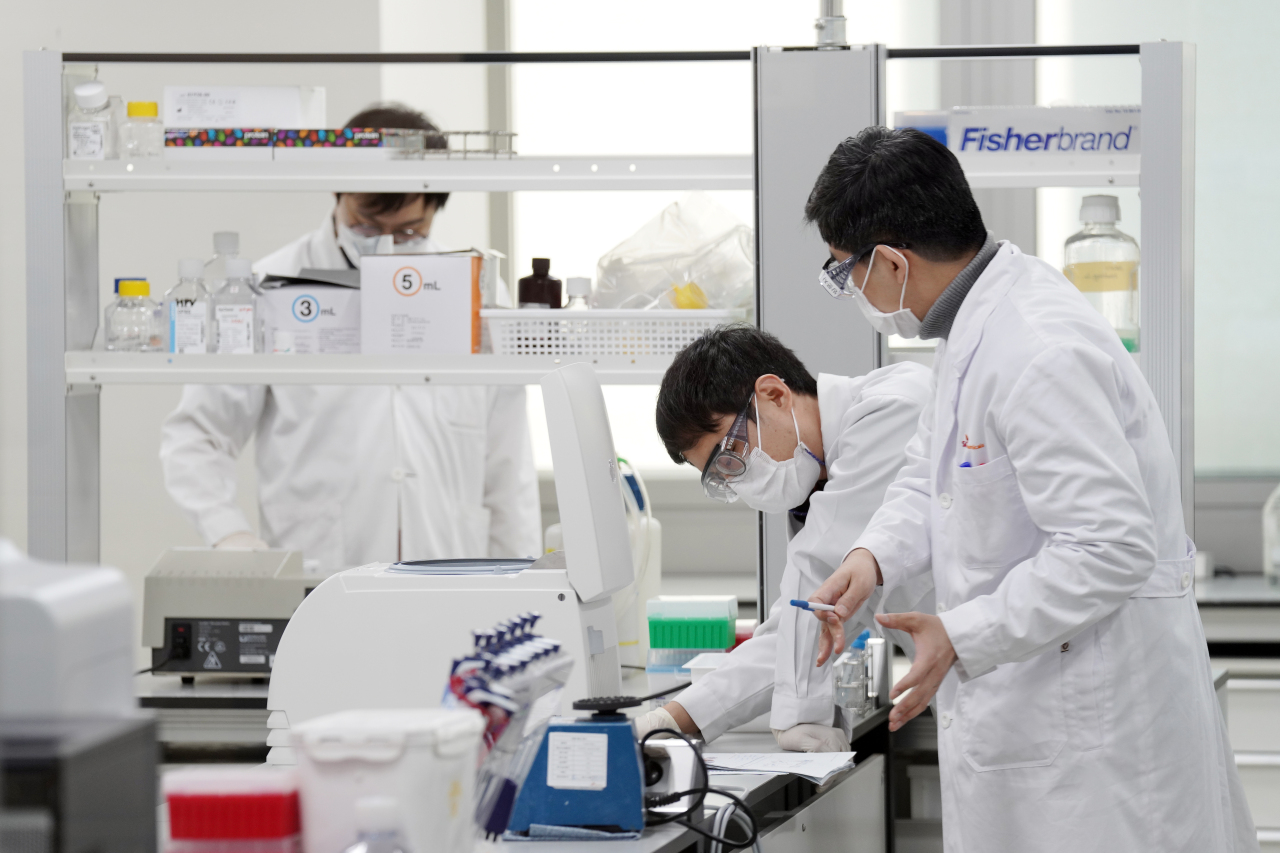Number of new drugs underway jumps 158% in 3 years
By Shim Woo-hyunPublished : Sept. 5, 2021 - 17:28

The number of drugs under development at South Korean companies has increased by 158 percent in the past three years, according to a local survey released Sunday.
According to Korea Pharmaceutical and Bio-Pharma Manufacturers Association’s survey on 299 pharmaceutical and biotech companies here, 193 firms currently operate 1,477 new product pipelines, up 157.8 percent from 100 firms’ 573 pipelines in 2018.
Of the 1,477 pipelines, 599 are for developing traditional nonbiologic pharmaceutical drugs, accounting for 40.6 percent. Biologic drugs came next with 540, taking up 36.6 percent.
In 2018, the number of pipelines for nonbiologic pharmaceutical drugs came to 225, while those for biologic drugs reached 260.
The survey said that 55 large pharmaceutical companies with over 100 billion won ($86.5 million) of annual sales currently operate 641 pipelines for new drugs, while small and midsize biotech firms have 836.
Large pharmaceutical companies are focusing on developing traditional nonbiologic pharmaceutical drugs with 375 pipelines. Biotech firms, however, are concentrating more on biologic drugs with 399 pipelines, the survey added.
By development stages, 403 pipelines are under the process of finding potential materials, while 397 are going through preclinical stages.
The number of pipelines that reached the clinical trial stage have also doubled during the three-year period, when compared to 2018.
Pipelines under phase 1 trials stood at 266, while those under phase 2 and 3 studies reached 169 and 116, respectively. The number of pipelines that are under phase 3 clinical studies increased 274.2 percent from 2018.
Anticancer drugs are most widely sought after in South Korea, accounting for 21.5 percent with 317 pipelines, followed by 173 pipelines for metabolic disorders and 146 pipelines for treating neurological disorders.
The KPBMA explained that the number of pipelines have increased as local pharmaceutical and biotech firms expanded investment in developing new drugs in recent years.
The association said investment in research and development last year reached 2.15 trillion won.
The R&D expense to revenue ratio of local pharmaceutical and biotech firms have also gone up to 10.7 percent from 8.9 percent in 2018.
The KPBMA said it is encouraging that South Korean firms have increased their expenses in R&D, although they are still behind the firms in the US and Japan. R&D expense to revenue ratios of the US and Japanese firms came to 18.2 percent and 17.3 percent as of 2019, respectively, it added.
Meanwhile, the survey also showed that technology transfer deals have also increased in recent years.
During the first quarter of this year, the number of tech transfer deals reached 85, accounting for 80 percent of last year’s total. In 2020, the number of deals reached 105, up from 36 in 2019.


![[AtoZ into Korean mind] Humor in Korea: Navigating the line between what's funny and not](http://res.heraldm.com/phpwas/restmb_idxmake.php?idx=644&simg=/content/image/2024/04/22/20240422050642_0.jpg&u=)


![[Herald Interview] Why Toss invited hackers to penetrate its system](http://res.heraldm.com/phpwas/restmb_idxmake.php?idx=644&simg=/content/image/2024/04/22/20240422050569_0.jpg&u=20240422150649)
![[Graphic News] 77% of young Koreans still financially dependent](http://res.heraldm.com/phpwas/restmb_idxmake.php?idx=644&simg=/content/image/2024/04/22/20240422050762_0.gif&u=)

![[Exclusive] Korean military set to ban iPhones over 'security' concerns](http://res.heraldm.com/phpwas/restmb_idxmake.php?idx=644&simg=/content/image/2024/04/23/20240423050599_0.jpg&u=20240423171347)






![[Exclusive] Korean military to ban iPhones over security issues](http://res.heraldm.com/phpwas/restmb_idxmake.php?idx=652&simg=/content/image/2024/04/23/20240423050599_0.jpg&u=20240423171347)



![[Today’s K-pop] Ateez confirms US tour details](http://res.heraldm.com/phpwas/restmb_idxmake.php?idx=642&simg=/content/image/2024/04/23/20240423050700_0.jpg&u=)